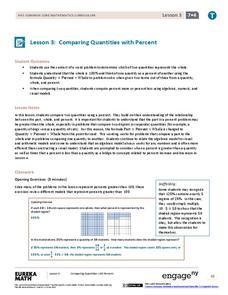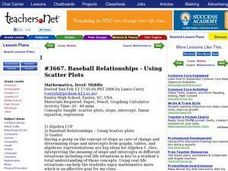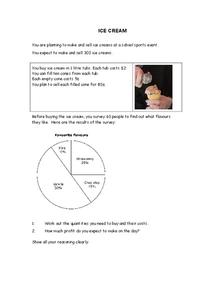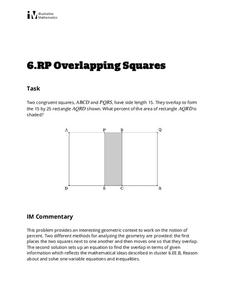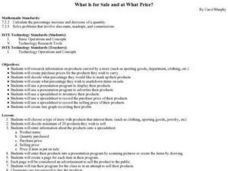Curated OER
M&Ms Count and Crunch
Learners practice skills involving statistics and probability by making predictions on number of each color candy in one pound bag of M&Ms. They record both guesses and actual quantities, calculate percentages, and create bar graphs...
EngageNY
Comparing Quantities with Percent
Be 100 percent confident who has the most and by how much. Pupils use percentages to help make the comparisons by finding what percent one quantity is of the other. They also determine the percent differences between the two quantities.
National Security Agency
Partying with Proportions and Percents
Examine ratios and proportions in several real-world scenarios. Children will calculate unit rates, work with proportions and percentages as they plan a party, purchase produce, and take a tally. This lesson plan recommends five...
Curated OER
Multiplication and Areas
Upper graders solve problems involving measurement of squares and rectangles to practice multiplication skills, finding area, and calculating prices and percentages. A performance assessment is included.
National Institute of Open Schooling
Chemical Arithmetics
Substances with the same empirical and molecular formula must be differentiated by their structural formula. Part two in a series of 36 has pupils using chemical formulas to calculate how much of a compound is present in a given...
Virginia Department of Education
Partial Pressure
At some point, everyone has been under pressure—even Dalton! Explore Dalton's law of partial pressures with young chemists as they measure the volume of air extracted from a sample compared to its original volume. Class members perform...
Curated OER
Ratios and Percents
Sixth graders practice finding percentages, converting them, and analyze percentage statistics and facts about rice. In this ratios and percentages lesson, 6th graders read information about percentages related to rice. Students complete...
Curated OER
Math: Football League Statistics
Students examine a soccer league final standings chart and then answer 12 questions based on the information provided. They calculate some answers in both fractions and percentages.
Curated OER
Rate Distortion
In this rate distortion worksheet, learners solve 4 different sets of problems that include defining the rate distortion curve in various situations. They construct a rate distortion curve by plotting and angle against a particular line...
Curated OER
What proportion of rough rice is prepared into consumable rice?
Fifth graders find the percentages of rough rice that can be eaten. In this percentage instructional activity, 5th graders look at 100 lbs. of rough rice and see the steps needed before it can become the white rice sold in stores. They...
EngageNY
Comparing Estimated Probabilities to Probabilities Predicted by a Model
Small groups devise a plan to find the bag that contains the larger percentage of blue chips. they then institute their plans and compare results to the actual quantities in the bags.
Curated OER
Percentages and Fractions of Amounts
In this math worksheet, students change percents to fractions on five problems. Students complete a table. Students find a given percent of five numbers. They complete five story problems involving percents.
EngageNY
Markup and Markdown Problems
There is a 100 percent chance this resource will help pupils connect percents to financial literacy. Young mathematicians use their knowledge of percents to find markups and markdowns in financial situations in the seventh segment in a...
Curated OER
Fuel Saving
Students explore the problem of percentages. Students find a given fraction or percentage of a quantity. Students devise and use problem solving strategies on problems explored.
Curated OER
Fractions
For this fractions worksheet, students solve and complete 3 different types of problems. First, they complete the table shown with the correct percentage, fraction or decimal. Then, students find the measurements shown. In addition, they...
Curated OER
Baseball Relationships - Using Scatter Plots
Students use graphing calculators to create scatter plots of given baseball data. They also determine percentages and ratios, slope, y-intercepts, etc. all using baseball data and statistics.
Curated OER
Cloze Instruction And Herringbone Technique
Students sort out important information and create a visual framework for reviewing in the future. They organize a large quantity of information thus helping with learning and remembering details, cause and effect, comparison and...
Mathematics Assessment Project
Ice Cream
I scream, you scream, we all determine the amount of ice cream! Pupils calculate the amount of ice cream flavors needed based on survey results in a short summative assessment. They determine the number of tubs and cost of ice cream to...
Illustrative Mathematics
Dana's House
Your class is to find the percent of the lot that is not covered by a house. Make sure your pupils understand the problems before they begin. The lot is the whole of the percent problem and the house is the part. The exercise is good...
Illustrative Mathematics
Overlapping Squares
The objective of this activity is to find the percent of the area of a two squares overlapping. Mathematicians find the ratio of area for the part that overlaps to the rectangle formed. The final answer is a percent as a rate per 100....
Curated OER
Empirical and Molecular Formula Sheet
In this formulas worksheet, students solve eight problems and are required to write the empirical and molecular formulas given percentage of elements or quantities in mass.
Curated OER
Getting Percentible
This unit explores the connections between percentages, decimals, and fractions. It focuses on strategies for solving problems involving percentages and applies these strategies to real life contexts.
Curated OER
Elasticity
High schoolers are introduced to the topic of elasticity. As a class, they identify demand as being either price elastic or price inelastic when given examples. They discover the relationship between percentage changes in the quantity...
Curated OER
What is for Sale and at What Price?
Seventh graders will research information on products carried by a store (such as sporting goods, department, clothing, etc.) They will create purchase prices for the products they wish to carry. They also will decide what percentage...



